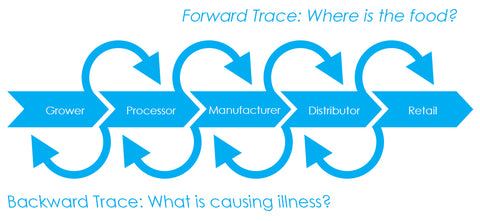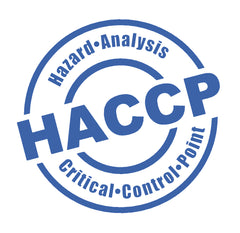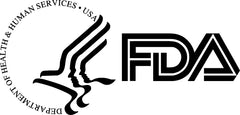Food Safety
| Food Safety | HACCP | The GFSI and BRCGS | The FDA | Kosher |
What is Food Safety?
Food Safety is the prevention of food-borne illness. Food-borne illness can be spread from improper handling, preparation, or storage of food. Transmission of bacteria, diseases, and dangerous pathogens can occur during any part of the manufacturing process, but monitoring, education, and proper procedures minimize the possibility of spreading food-borne illness. Prevention starts with us -- the packaging manufacturer.
What is Food Safety to WSP?
Here at WSP, we believe that food safety starts with our staff and extends to our associates and our 3rd party partners. We implement a number of practices to prevent food-borne illness, and often break away from our routine schedule for extra programs, training and education. We have implemented policies and procedures based on our customer requirements, GFSI and BRCGS standards, local, state and federal regulations, and our own policies to ensure that we produce a direct contact food packaging that is safe to use. As the world changes and laws governing the prevention of food-borne illness become more intricate, we will continue to be aware of, and implement any policies, programs, or systems that will keep the end user safe. We take our responsibility as a packaging manufacturer seriously and know we are the front line in preventing food-borne illness.

How Does WSP Prevent Food-Borne Illness?
WSP implements a number of policies and procedures to ensure our products remain certified for food-contact. These include:
• Raw Materials Inspections & Validation
• Packaging Requirements & Inspections
• Contractors and Visitors Policies and Procedures
• Good Manufacturer Practices (GMPs)
• Pest Management
• Hazard Analysis and Critical Control Points (HACCP)
• Maintenance Program
• Preventative Maintenance
• Internal Audits
• Supplier Audits
• Safety Data Sheets
• Sanitation Program
• Quality Control
• Employee Training
• Allergen Program
• Traceability & Recall Program
• Supplier Transparency Policy
• Transportation Policies and Procedures
Our quality assurance customer package includes the following letters:
• BRCGS Certification
• Letter of Guarantee (FDA)
• Diisonyl Phthalate (DINP) - CA Prop 65
• Bisphenol A (BPA)
• CONEG
• Allergen Policy
• Genetically Modified Organisms (GMO)
• Gluten Free
• Supplier Code of Conduct/Transparency Act
• Specifications
• Certificate of Analysis (COA)
• Made in USA
Request a Sample QA Package
Back to the Top
The HACCP

What is the HACCP?
Hazard Analysis and Critical Control Points (HACCP) is a systematic, preventative approach to food safety. The goal is to review the manufacturing process and identify areas that can cause biological, chemical and physical hazards that might make the finished product unsafe. By identifying these problems early, they can be corrected before the product is manufactured. This helps to minimize any problems the final product might have.
What is HACCP to WSP?
We believe that HACCP education for employees is an important step to monitor any unknown hazards that can cause our finished product to be unsafe. Communication of these hazards can prevent serious food safety issues and it starts with our personnel. Senior management reviews our HACCP Plan annually to properly assess if it is sufficient to prevent future hazards from contaminating the finished product. They then inform the team of any new hazards so everyone is able to help keep our products safe.
Back to the Top
The GFSI and BRCGS
What is GFSI?

The Global Food Safety Initiative (GFSI) is a private organization established and managed by the International Trade Association and the Consumer Goods Forum. The GFSI maintains a scheme to benchmark food safety standards for manufacturers, producers, and retailers.
What is the BRCGS?

Brand Reputation Compliance Global Standards is a trade association established in the UK. It is now recognized as a global standard and a scheme of the GFSI. There are over 23,000 certified locations worldwide and a large network of BRCGS certification bodies in 123 countries. Their requirements guarantee the standardization of quality, safety and operational criteria and ensure that manufacturers fulfill their legal obligations and provide protection for the end consumer. BRCGS global standards are now often a fundamental requirement of leading retailers.
What are the GFSI and BRCGS to WSP?
The GFSI and BRCGS provide standards that we proudly follow in WSP daily activities. They complement our food safety policies, procedures, local, state and federal regulations, and customer requirements. As changes in standards impact the manufacturing process, we believe that all manufacturers or distributors of direct-contact food packaging should be audit ready at all times. We happily hold ourselves to these standards and exceed the expectations of our customers and end users.
In 2018, WSP received a “AA” rating from BRCGS Issue 4 Audit by NSF International.
Back to the Top
The FDA
 What is the FDA?
What is the FDA?
The US Food and Drug Administration (FDA) is a federal agency responsible for protecting and promoting public health through the regulation and supervision of food safety, tobacco products, dietary supplements, prescription and over-the-counter pharmaceutical drugs (medications), vaccines, biopharmaceuticals, blood transfusions, medical devices, electromagnetic radiation emitting devices, cosmetics, animal foods & feed, and veterinary products. The FDA created regulations specific to the food industry found in 21 CFR Parts 175 to 178.
What is the FDA to WSP?
As a small manufacturer in the United States, we believe that hazard prevention starts with us. Similar to GFSI standards, the FDA compliments our programs and we respect and adhere to all new governing regulations passed. Over time, we expect to exceed these regulations to provide the end user with a safe and usable finished product.
Back to the Top
Kosher

What is Kosher?
Kosher foods and products strictly adhere to the dietary laws set by the Torah. However, many people who do not follow a Kosher diet look for Kosher certified products because they are of higher quality.
What is Kosher to WSP?
With 12.1 million Americans consuming Kosher products every year, it only makes sense for us to prove our commitment to quality by being Kosher certified. Not only are our products safe for consumers following Kosher, Halal, vegan and dairy free diets, they are also produced using higher standards and quality materials.
Back to the Top

 What is the FDA?
What is the FDA?